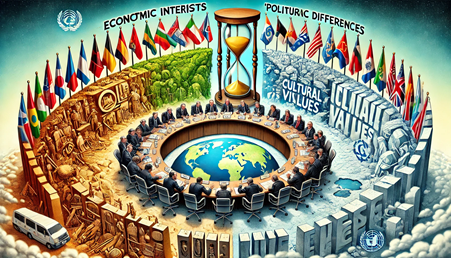Why is international cooperation on climate change so challenging?

Why is international cooperation on climate change so challenging?
by Sebastian 03:12pm Jan 02, 2025

Why is international cooperation on climate change so challenging?
Why is international cooperation on climate change so challenging?
International cooperation on climate change is challenging for several interconnected reasons:
1. Diverging National Interests
Economic Priorities: Countries have different economic priorities. Developing countries often prioritize economic growth, poverty reduction, and industrialization, which can conflict with the urgent need to reduce carbon emissions. In contrast, developed countries may be more focused on achieving emission reductions but may face pushback from industries that depend on carbon-intensive energy sources.
Historical Responsibility: Developed countries are historically responsible for much of the greenhouse gas emissions, which creates tension when emerging economies like China and India seek to avoid being held to the same standards without the same historical context. This historical responsibility gap makes equitable action more difficult to achieve.
2. Global vs. National Benefits
Public Goods Problem:Climate change is a global public good problem, meaning the benefits of reducing emissions are shared worldwide, but the costs are often borne by individual countries. This makes it harder to convince each nation to take strong action when they do not receive a direct or immediate benefit from doing so.
Free Rider Problem: Some countries might rely on others to take action while they continue to pollute, hoping to benefit from global efforts without contributing their share (i.e., free riding).
3. Economic Costs and Trade-Offs
Transitioning to Green Economies: Shifting to low-carbon energy sources and sustainable practices often requires significant investment in new technologies, infrastructure, and policies. For some countries, particularly those with economies dependent on fossil fuels (like oil-rich nations), this can be economically costly and politically challenging.
Jobs and Industries: Transitioning away from fossil fuels can cause job losses in industries like coal mining, oil extraction, and gas production. Countries must balance environmental goals with the political and social challenges of transitioning workers to new industries.
4. Political and Institutional Challenges
Short-Term Political Cycles: Climate change requires long-term policy commitments, but political leaders are often focused on short-term goals. Leaders may hesitate to implement costly or unpopular policies, fearing they might not be in power when the benefits of climate action are realized.
National Sovereignty: Countries are often wary of international agreements that limit their sovereignty or impose external regulations. International climate agreements require countries to agree on legally binding commitments, which can be politically sensitive.
5. Unequal Capacities to Act
Financial and Technological Resources: Wealthier nations typically have more financial resources and technological capabilities to mitigate and adapt to climate change. Meanwhile, many poorer countries struggle with limited resources, making it difficult for them to invest in sustainable solutions without significant international support.
Capacity for Implementation: Even when countries agree to climate goals, they might lack the necessary institutions, regulatory frameworks, or enforcement mechanisms to implement them effectively.
6. Competing Global Priorities
Other Global Issues:Many countries also face other pressing challenges like poverty, health crises, or security concerns. In some cases, these issues may take precedence over climate action, making it harder for countries to prioritize climate change on the global agenda.
Geopolitical Tensions: Climate change is often intertwined with broader geopolitical tensions. Countries may prioritize security or economic competition over environmental cooperation, particularly when they see climate agreements as tools that could shift global power dynamics.
7. Uncertainty and Complexity
Scientific Uncertainty: While the broad consensus on climate change is clear, there is still some uncertainty about the exact impacts of climate change and the best strategies to mitigate it. This can make negotiations challenging, as countries may be hesitant to commit to specific actions without clearer scientific consensus on the most effective paths forward.
Complexity of Solutions: Climate change solutions often involve a wide array of sectors, including energy, transportation, agriculture, and land use. Coordination across these sectors is difficult and requires complex, multi-faceted policies that must be tailored to each country’s specific circumstances.
8. Lack of Trust
Historical Failures: Previous international climate agreements, such as the Kyoto Protocol, have often faced issues with compliance and enforcement. Trust between countries can be damaged when parties fail to meet their commitments or withdraw from agreements, as seen with the United States' withdrawal from the Paris Agreement under the Trump administration.
Varying Commitments: The perceived inequity in commitments—where some countries are not doing enough or pulling out of agreements—can erode trust and lead to frustration, which hampers further cooperation.
9. Cultural and Ideological Differences
Climate Denialism and Ideology: In some countries, particularly where climate change is politicized, there are powerful groups or political movements that downplay the importance of climate action, making cooperation difficult.
Cultural Perspectives:Different countries may have varying cultural perspectives on nature, resource use, and environmental stewardship, which can influence how they view climate action and the urgency of addressing climate change.
These factors create a web of challenges, making it difficult to reach and implement strong international agreements on climate change. Despite these hurdles, international cooperation remains essential for addressing the global nature of the crisis, but it requires balancing diverse interests, overcoming political and economic challenges, and fostering trust and solidarity among nations.






